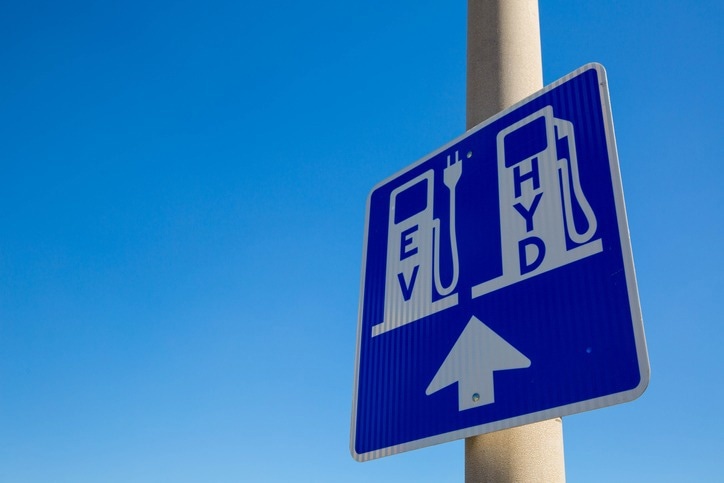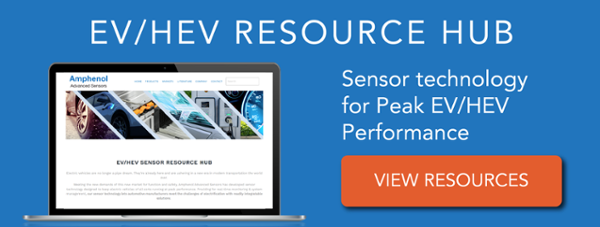There have been two front-runners in the race for an alternative source of fuel for vehicles over the last few years: electricity and hydrogen.

Image Credit: Amphenol Sensors
Electricity may have a convincing lead as it stands, with battery-powered vehicles dominating the market, but hydrogen is still a player in the global shift away from fossil fuels.
Hydrogen fuel cells are able to store energy more densely; therefore, they can typically travel greater distances before refueling and without producing harmful emissions. Boasting zero emissions, battery-powered electric vehicles (EVs) siphon power from the rechargeable battery, and the infrastructure of charging stations nationwide is growing rapidly.
Despite both vehicle types using different fuel sources to satisfy the demand for environmentally friendly transportation, they share a common need for reliable and efficient sensors to control heat and ensure proper operation.
Hydrogen Fuel Cell vs. Battery-Powered Vehicles: Not an Either-or
Both types of vehicles ultimately serve the same core purposes:
- Reducing the environmental impact of transportation
- Providing alternate power sources
- Moving people and items
Though EVs have the lead in the market for alternate fuel vehicles, hydrogen vehicles also have a place in transportation. With a range and power comparable to those of traditional vehicles with internal combustion engines, hydrogen-powered vehicles are frequently used in industrial and commercial applications:
- Semis
- Heavy vehicles
- Buses
- Boats
The Risks of Hydrogen Fuel Cell vs. Battery-Powered Vehicle
Like all modes of transport, there are safety risks associated with electric and hydrogen-powered vehicles.
Hydrogen-Powered Vehicles
Hydrogen is extremely lightweight with a density 14 times less than air and has the highest energy content per unit mass of all fuels. Hydrogen is also one of the smallest molecules and therefore is more prone to escaping through small openings than other gaseous or liquid fuels.
Monitoring using sensors is of particular importance for hydrogen-powered fuel cells because hydrogen gas is highly inflammable when in a mixture with air. The majority of Fuel Cell Vehicles have several Hydrogen Leak Sensors to protect the vehicle from escaped hydrogen.
Complex control systems are required in fuel cells for protection. In the absence of sensors giving real-time readings and triggering maintenance systems, fuel cells can become damaged beyond repair.
For example, a faulty pressure relief valve can lead to stress cracks and the release of a flammable combination. In the event of a crash, the hydrogen gas could ignite and explode.
Battery-Powered Vehicles
In EVs, the most significant issue is thermal management. For engineers, this has been a great challenge to balance power and performance while managing heat.
Consumers predict that EV vehicles will be comparable to those using combustion engines when it comes to performance and speed, which creates a greater demand for electric batteries, in turn generating more heat.
Battery cells, when subject to high temperatures, degrade, which affects their performance and shelf life. An overheating cell can trigger a chain reaction and propagate heat to the full module, with gas generated; as a result, leading to thermal runaway.
Once this process is underway, it is difficult to stop. It is also possible – though rare – that thermal runaway can result in fires.
Sensor technology is key to thermal management to maintain temperatures within the optimal range and prevent the spread of thermal runaway. New sensor technology can also detect gas release that is being vented by a cell (a precursor to thermal runaway).
An additional concern for the owners of battery-powered EVs is quick charging. A fast charge is universally desirable, but a fast charge also generates heat. The risk of related damages increases significantly in the absence of real-time monitoring to maintain ideal temperatures.
Other Challenges for Hydrogen Fuel Cell vs. Electric Cars
Other factors seem to limit hydrogen fuel cell vehicles when it comes to long-term viability as a major mode of transportation adopted by the public.
Fueling Infrastructure
While hydrogen is the most abundant element in the universe, the infrastructure which facilitates its use as fuel is not. In 2021, there were only 47 hydrogen fueling stations available to the public in California and only one in Hawaii. More are being built, but there is no movement towards mass adoption by consumers.
By comparison, the US Department of Energy lists close to 46,000 public charging stations and 120,000 charging ports nationwide.
Mass Production
Electric vehicles are already being mass produced. Bloomberg NEF reports that with 5.6 million sold, 2021 was a record year for EV sales. This is an increase of 83% from 2020 and 168% from 2019. The launch of 22 new EV models is also expected in 2022.
The US Department of Energy lists only five purchasable hydrogen fuel cell cars, although Honda has already discontinued manufacturing its Clarity model. At the same time, BMW and Audi have hydrogen fuel cell vehicles in development for production in 2030.
It is unlikely that the average person will ever drive a hydrogen-powered vehicle as they become more custom vehicles than mainstream.
Total Cost of Ownership
The total cost of ownership (TCO) is another challenge for hydrogen fuel cells vs. electric vehicles. Comparing hydrogen fuel cells with electric cars, hydrogen fuel cell cars are more expensive over their lifetime.
Comparing the price of a hydrogen fuel cell vs. electric car will show that hydrogen vehicles cost between $50,000 and $70,000 while EVs can go as low as the Nissan Leaf’s MSRP of $27,400.
EV components also typically have a longer lifespan, and much of what is classified as a “repair” to an electric vehicle is software updates or upgrades.
Sensor Technology: Making Next-Gen Vehicles Possible
Robust sensor technology is essential for hydrogen vehicles and EVs to ensure they function properly, maintain safety, and optimize performance. A hydrogen vehicle requires up to 27 sensors to monitor its power generation alone for safe operation.
Next-generation vehicles require in excess of 100 sensors to monitor systems and power increasingly sophisticated technology from collision detection to thermal management. Advanced sensors will be the driving force that allows autonomous vehicles to operate safely as well.

Image Credit: Amphenol Sensors
The Future for Electric vs. Hydrogen Fuel Cell Cars
With EVs well on their way to broader adoption in the consumer and industrial markets, hydrogen fuel cell vehicles will likely assume a role in the industrial market.
Technological advances will likely continue to reduce costs for both EVs and Hydrogen fuel cell vehicles — all utilizing sensors for monitoring and regulation to optimize performance and safety.

This information has been sourced, reviewed and adapted from materials provided by Amphenol Sensors.
For more information on this source, please visit Amphenol Sensors.